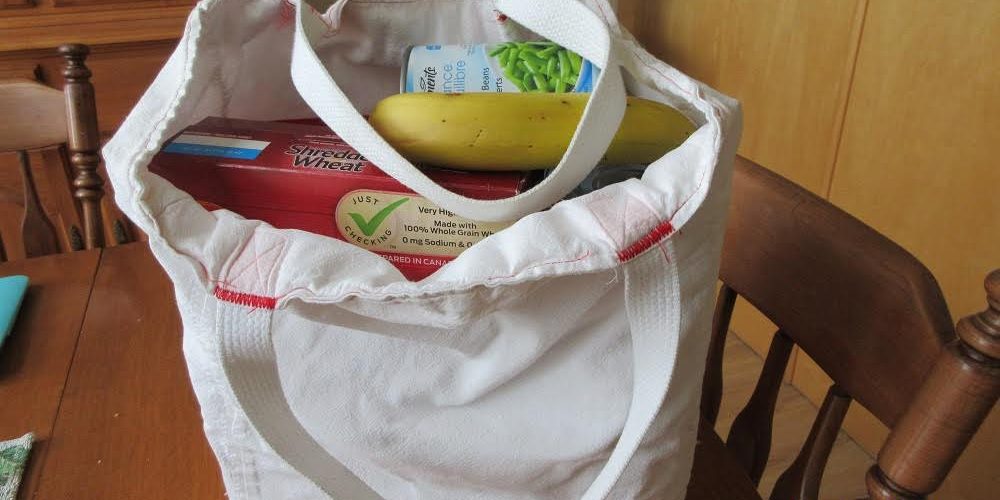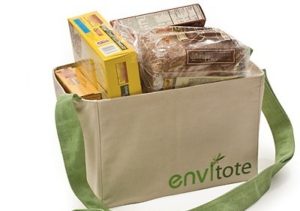Can we be both clean AND green?

The Covid-19 crisis has reopened discussion about the sanitary issues with reusable grocery bags. I recently read an article called “Greening Our Way to Infection” in City Journal, a magazine based in New York City. It discusses government bans on single use plastic and the problem of bacteria and viruses building up in reusable bags. It also touches briefly on the issues of reusable cups in coffee shops such as Starbucks.
The article sited a 2018 study on the spread of Norovirus via reusable bags in the Journal of Environmental Health as well as a 2011 study by the University of Arizona on cross contamination of food products by reusable shopping bags.
The article goes on state what the New York Department of Health recommends to ensure reusable bags stay clean:
“The department advises grocery shoppers to segregate different foods in different bags; to package meat and fish and poultry in small disposable plastic bags inside their tote bags; to wash and dry their tote bags carefully; to store the tote bags in a cool, dry place; and never to reuse the grocery tote bags for anything but food.”
Much of this advice is also suggested by Cleveland Clinic in the following video:
If followed, the above measures seem like they would mitigate the sanitary problems. The City Journal article, however, presented a dim stance on the subject suggesting that this is not something we should expect from consumers:
“Anyone who has studied consumer behavior knows that it’s hopelessly unrealistic to expect people to follow all those steps. If the Department of Health actually prioritized public health, it would acknowledge what food manufacturers and grocers have known for decades: disposable plastic is the cheapest, simplest, and safest way to prevent foodborne illnesses.”
This was disappointing to read. Rather than throw up our hands and stop promoting reusable bags, perhaps there are things that could help consumers maintain bag cleanliness. My ideas are:
- Encourage people to choose bags that fit their lifestyle. Some people may be fine with bags that need a cold delicate cycle and air drying (eg. polypropylene bags) but others will want ones that can be laundered in hot water and dried in a dryer (eg. cotton).
- Manufacturers making cotton bags should use pre-shrunk material so that people can launder their bags without worrying that they will shrink.
- Manufacturers could print washing reminders on the bags themselves and create sets with different coloured bags for different types of food.
- Supermarkets could offer a disposable plastic grocery bag for meat products.
- Produce can be cross-contaminated with bacteria such as E. coli. To keep this from building up in fabric grocery bags, consumers should continue to have disposable produce bags available. That said, many eco-conscious shoppers have re-usable produce bags in addition to their tote bags. This is great! These produce bags should be washed between shopping trips.

Point number four would mean not outright banning plastic grocery bags. I think they do serve a purpose for those grocery items that are more likely to spread bacteria such as meat and produce. Also, some people will always prefer the plastic bags for the convenience of them and these people are the ones who are least likely to keep reusable bags clean. So I say let them have their plastic bags. Many people give them a second purpose as waste bin liners – so they aren’t really a single-use item.
On the issue of reusable coffee cups the article mentioned:
. . . “state legislators advanced a bill that would force coffee shops to accept consumers’ reusable cups—a practice that Starbucks and other chains have wisely suspended to avoid spreading the Covid-19 virus.”
I had heard about Starbucks taking this measure to avoid the spread of Covid-19 and I supported their position for the safety of their workers and customers. Global News reporting on this story quoted the following from microbiolist Jason Tetro, host of the Super Awesome Science Show:
“A reusable cup handed over the counter could be contaminated: “The way that works is that the droplets or other bodily fluids that would be on the cup, in the process of making a new drink, could possibly lead to spread of the droplets to other equipment that could then be used to prepare drinks for other people.”
For the above reason I don’t think people’s reusable cups from home should ever be accepted in restaurants. The cashiers / servers at these places have no way of knowing how thoroughly the cup was washed or if it was even washed at all. Accepting cups means their hands and equipment such as espresso machines, could become cross contaminated with bacteria or viruses thus putting them and other customers at risk. Travel cups are great for making coffee at home and taking it with you but not for taking to restaurants that serve hundreds of people a day. If you love Tim Horton’s or Starbucks or whatever, many of these outlets sell their brand of coffee for home brewing.
But what about all the disposable cups going to the landfills? Shouldn’t we do something about that problem? Absolutely. People love the convenience of spontaneously stopping for a coffee on the go or grabbing one quickly on the way to work. The cups don’t have to end up in a landfill. Some of them are compostable depending on municipal facilities. Some can be recycled with plastics. For those that must be thrown out I would like to see them and other non-recycles put through a plasma waste-to-energy facility. These are high temperature plasma gasification systems that have virtually no emissions. As they gasify garbage down to the molecular level these facilities also generate electricity that can be used by the municipality. Below is a Ted-x Talk about this technology :
What do you think about the sanitary issues of reusable shopping bags and reusable travel cups? Do you think plasma waste-to-energy facilities are a good solution for garbage? Feel free to comment below.
Top feature photo of cotton shopping bag filled with groceries by Lynn R.
Above photo of Envitote bag from Wikimedia Commons.
Links for Further Reading
The Best Way to Wash Reusable and Recyclable Grocery Bags (The Spruce, April 16, 2020)
What are the best ways to keep reusable bags germ-free? Health Matters (Cleveland.com, Feb. 9, 2020)
Life Cycle Assessment of grocery carrier bags (Ministry of Environment and Food, Denmark, Feb. 2018)
Everything You Need to Know about Fresh Produce and E. coli (The Conversation, Jan. 22, 2018)
Reusable Grocery Bags Contaminated With E. Coli, Other Bacteria (University of Arizona, June 24, 2010)
How to Clean Reusable Shopping Bags (WikiHow, March 19, 2019)
Battle of the Grocery Bags – Plastic vs Paper (New York Times – historical – Nov. 17, 1984)
I have been using my reusable shopping bags since before it was fashionable. I am rarely sick. I get a cold about every 7 to 10 years. If my grocery bags are contaminated then so are my clothes. They are all washed together and for most of the year hung out to dry in the country air and sunshine. If some people are using them year after year and not washing them I can see it being a problem. A little common sense folks! Please!